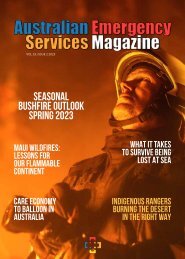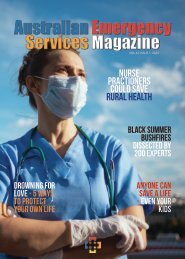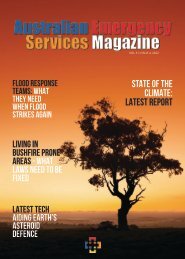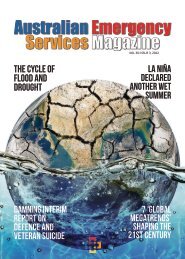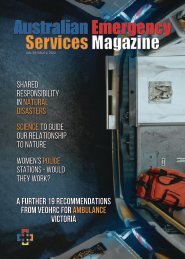Vol. 13 Issue 3. 2019
• Latest Events • Emergency Law with Prof. Michael Eburn • Friendships & Career in the Emergency Sector • Technology changing Police Surveillance • Natural Disasters & Mental Health • Click image to read more......
• Latest Events • Emergency Law with Prof. Michael Eburn • Friendships & Career in the Emergency Sector • Technology changing Police Surveillance • Natural Disasters & Mental Health • Click image to read more......
You also want an ePaper? Increase the reach of your titles
YUMPU automatically turns print PDFs into web optimized ePapers that Google loves.
Erin Smith Course Coordinator and Senior Lecturer in Disaster Response at Edith Cowan University and Amee Morgans Executive Director Operations Support ESTA<br />
I believe you and Amee also<br />
worked on a research paper<br />
together around paramedics’<br />
perceptions; can you talk a bit<br />
more about that work?<br />
Amee: Yes, in 2009, Erin and I<br />
worked on a research paper titled<br />
‘Paramedics’ perception of risk and<br />
willingness to work during disasters’.<br />
Paramedics, as emergency healthcare<br />
workers and frontline responders<br />
are expected to be both willing and<br />
able to respond when disaster strikes.<br />
In summary, this research looked at<br />
whether the willingness to work is<br />
directly influenced by paramedics’<br />
perception of risk.<br />
Erin: In terms of methods, a total of<br />
58 Victorian paramedics participated<br />
in this study and a total of 12 focus<br />
groups were conducted throughout<br />
the state, with each group facilitated<br />
by the use of three different<br />
emergency services scenarios. We<br />
then analysed each groups’ reactions<br />
to those scenarios.<br />
It’s clear from your careers<br />
and research that you’re both<br />
passionate about the wellbeing of<br />
emergency services workers. How<br />
important is this to the sector as<br />
a whole?<br />
Erin: A lot of my work to date<br />
looked at the long-term impacts on<br />
first responders after disasters. For<br />
example, with my research involving<br />
9/11, I followed the paramedics and<br />
their families over 15 years to see<br />
the mental health impact that 9/11<br />
had. The emergency services sector,<br />
because of the nature of its work,<br />
is one that can have high levels of<br />
anxiety and stress and other mental<br />
health issues. It’s important that as a<br />
sector we continue to address these<br />
issues and ensure that our people are<br />
getting the right help before, during<br />
and after disasters.<br />
Amee: The 2009 Victorian bushfires<br />
was when I saw the mental health<br />
consequences on those from my<br />
own family who work in emergency<br />
services; my sister works in triple<br />
zero, one brother is a police officer<br />
and my other brother is a firefighter.<br />
To see the impacts on my own family<br />
really drove home how important<br />
looking after your wellbeing is in<br />
this sector is. Both Erin and I, in<br />
our roles, are looking at trying to<br />
make the workforce a healthier place<br />
for emergency services workers by<br />
looking at how we can set up better,<br />
how we can manage things better and<br />
how do we recover better. If people




